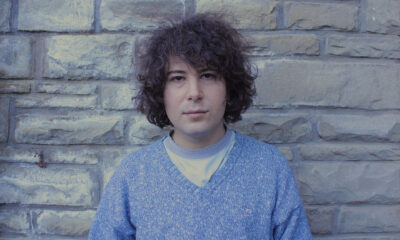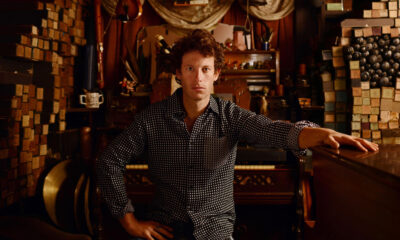Interviews
Interview with Overkill vocalist Bobby “Blitz” Ellsworth
Thrash Metal pioneers, Overkill will be releasing their latest offering, Ironbound, in February 2010 and vocalist Bobby “Blitz” Ellsworth set aside some time to answer some questions for PureGrainAudio.

Thrash Metal pioneers, Overkill will be releasing their latest offering, Ironbound, in February 2010. I have been a huge fan of Overkill for the past twenty-five years; in fact, I was a regular at their New York shows before they had even signed a recording contract. Needless to say, I have been anticipating this record for a while now and I must say after receiving an advanced copy it has found its way into regular rotation in my player. Overkill was definitely the soundtrack of my early formative years. When the opportunity arose to speak with the band, I was more than stoked. Vocalist Bobby “Blitz” Ellsworth set aside some time to answer some questions for PureGrainAudio.
Did you ever imagine when you started that you would be releasing albums almost 25 years later?
Bobby: No we never could have seen that back then. We have always had a day-to-day kind of attitude; we live in the day and then see what happens the following day. When you take the attitude of living one day to the next it eventually accumulates into months and then years and in our case, it has been a couple of decades now. The thing that makes me more proud than the amount of time we have been around is the time versus what has been viable over the past twenty-five years. We have never broken up, there is no reunion tour, there are still two original members in the band after a quarter of a century and we are still releasing stuff that is on a high level as opposed to rehashing stuff from twenty-five years ago.
Your brand new CD Ironbound is set for release in February. Now that it is complete how do you feel about it? Are you satisfied with the outcome?
Bobby: Obviously the key is to be satisfied when you are in the studio. Sometimes it is hard to see the forest because of all of the trees when you are in the studio. The idea is that you feel satisfaction; you do not necessarily see or hear it, that comes later through objectivity. We do not leave the studio until a feeling of satisfaction comes about. When you talk about Ironbound or you talk about Feel The Fire there is a high level of value, principle and purity with regards to what we do.
What was the writing process like for Ironbound? Did you guys all write together?
Bobby: It was relatively simple for us you know, we have a process; we have been doing this for a long time now. DD Verni and I are the principle writers and it starts with DD collecting the riffs from say, the last record, until we start assembling. Then we start assembling those into songs and doing the preproduction. Everybody is included in the writing process; it is a very democratic kind of process.
Do you decide on a suitable sound fairly quickly, or do you tend to tweak tones obsessively?
Bobby:We tweak obsessively. Every time you tweak a kick drum, it changes where the guitar sits. If you tweak the guitar it changes where the kick drum and the bass sit. The easiest non-tweak for us is my vocals because they usually find an avenue of their own when everything else is correctly tweaked.
What can fans expect when they pick up a copy of Ironbound?
Bobby: I think reinvention. I think that is probably the key word to it. The Thrash scene has kind of come full circle since its revolution in the early Eighties and it is now back to that revolutionary form again. What I find in Ironbound is that it is deeply rooted in the past yet at the same time the reinvention itself gives it a kind of contemporary vibe. We had Peter Dothgren from Hypocrisy mix this and he is like the ears of the scene right now. He is brutal, he knows how to bring things out with regards to the mixing and he knows the relationship between the drums and the guitars and bass. I think what you will find with this record is a revisiting of what was, with a very contemporary value on top of it.
When you compare the early days of Thrash metal to the scene today what do you feel has changed for the better? What do you feel has become worse?
Bobby: The reason the Thrash Scene started back in the Eighties was in answer to what was going on at the time, socially and politically. It was the anti- emphasis of what the popular music was at that time. I see a lot of that same stuff going on right now in the scene. I think it is a direct influence on what today’s music is with regard to the newer bands. But I think in order for the newer bands to survive they have to put an original stamp on their music soon. Eventually you have to start cutting your own path. I think that is what is happening with bands like Warbringer and Suicidal Angels. We are starting to see stuff happening with originality factors coming into play.
How much roadwork do you expect to be doing in 2010?
Bobby: Starting in February we will be in Europe for approximately a month. In March, we are in South America for about half of the month. The U.S. tour starts in Philadelphia on April 1st and that will take us into May. Then the festival season starts and we have about twelve festivals lined up right now. European Festivals are awesome for anybody who has not had a chance to attend from the U.S.; you can bring your tent, fill it with beer and see some great bands over a three, four or five day period. Following that we will be doing second legs of both America and Europe in the fall.
Are the rigors of touring taking more of a toll on you as you get older?
Bobby: Not really. I am usually prepared and I am not a worrywart over things. I look forward to touring and I liken it to a drug that I keep chasing. I get ready for a tour obviously. I live pretty decently, I don’t like fast food and I have always worked out. I don’t really feel that I am getting older and it is getting harder. I kind of look forward to it because I can say that I have a hundred times already booked this year where I can get high off of this.
Do you think the band is getting more respect now as opposed to 10 or 15 years ago?
Bobby: I don’t know. Ten or fifteen years ago was a unique time. That was the mid-Nineties and the grunge scene was stomping out things. The cool thing was that many bands went home to work for mom and dad and there were so few left that it was really kind of a fertile time. We did not get respect from mainstream press but we got way big kudos from the underground for hanging around. This really solidified the future for us. We were walking the walk instead of talking the talk. 1993 until 2000 were great fruitful times for Overkill based on the fact that there were probably eight touring American bands that were on the Thrash scene.
How is the current economic slump affecting your band?
Bobby: It affects the record industry which in turn affects us. When you couple that with downloading, it affects us. I think one of the really cool things about music, or any entertainment for that matter, is that historically it becomes an affordable alternative because people need places to go and things to do. It is not the vacation you take with your kids or your girlfriend it is just thirty bucks for the night. A couple of beers and you are out of there with forty-five beans for the night. I don’t really notice it with regard to people. I do notice it with regard to he record companies.
In a hundred years from now what will the music history books say about your band?
Bobby: That is interesting. Overkill… Thrash Band… Stayed true to their New York roots and did it their own way.
Any closing words?
Bobby: Keep your eyes out for Ironbound. It is a really good work and I am really happy with it. It has a set of nuts on it and that is what this is all about.
-

 Hardcore/Punk6 days ago
Hardcore/Punk6 days agoHastings Beat Punks Kid Kapichi Vent Their Frustrations at Leeds Beckett University [Photos]
-

 Culture7 days ago
Culture7 days agoCirque Du Soleil OVO Takes Leeds Fans on a Unique, Unforgettable Journey [Photos]
-

 Alternative/Rock5 days ago
Alternative/Rock5 days agoA Rejuvenated Dream State are ‘Still Dreaming’ as They Bounce Into Manchester YES [Photos]
-

 Music2 hours ago
Music2 hours agoReclusive Producer Stumbleine Premieres Beat-Driven New Single “Cinderhaze”
-

 Indie1 week ago
Indie1 week agoMichele Ducci Premieres Bouncy New Single “You Lay the Path by Walking on it”
-

 Culture18 hours ago
Culture18 hours agoDan Carter & George Miller Chat Foodinati Live, Heavy Metal Charities and Pre-Gig Meals
-

 Alternative/Rock1 week ago
Alternative/Rock1 week agoWilliam Edward Thompson Premieres His Stripped-Down “Sleep Test” Music Video
-

 Country1 week ago
Country1 week agoJayce Turley Reflects on “Misery” with the Premiere of His New Single












